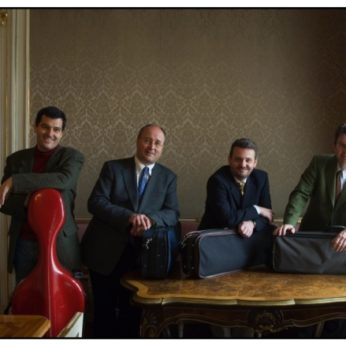Composer: Wolfgang Amadeus Mozart (b. 1756 - d. 1791)
Performance date: 28/06/2010
Venue: Bantry Library
Composition Year: 1787
Duration: 00:48:55
Recording Engineer: Anton Timoney, RTÉ lyric fm
Instrumentation: 2vn, va, vc
Instrumentation Category:String Quartet
Artists:
Artis Quartet (Peter Schuhmayer, Johannes Meissl [violins], Herbert Kefer [viola], Othmar Müller [cello]) -
[quartet]

The delightful custom of making instrumental versions of opera
excerpts began in France in 1770, later taken up in Vienna, where complete
operas were soon being transcribed for the magnificent Imperial Wind Band.
After the successful opening of Die
Entführung aus dem Serail, Mozart
was racing to arrange it for the Wind Band otherwise
someone else will get in first and pocket my profits. Speed was essential if the
composer wanted to exploit this lucrative possibility of recycling his score,
but in the absence of copyright rivals, unhindered by the demands of producing
a premiere, often got there first.
And this was not the end of the
process – members of the Imperial Wind Band would then profit from their
priviliged position by preparing other arrangements for different combinations
of instruments. Johann Went was second oboist in the Imperial Wind Band and
also a member of the Court Theatre Orchestra and he became one of the most
prolific and skilful arrangers of the 1780s and 1790s. His version of Don Giovanni for flute, violin, viola and cello
dates from 1788 barely a year after its Prague premiere in October 1787 and is
a classic example of the way these arrangements took on a life of their own for
by 1804 another anonymous arranger had created a version for string quartet
from Went’s already second-hand version.
Most of these
arrangements for string quartet that flourished in the new century were
primarily designed for amateur performance in middle-class musical life and not
for public performance by professional musicians. However Went’s version is
technically very demanding and he clearly lavished great care on it as can be
heard in his original way of handling melody and accompaniment and his use of
tone colour. But in a country more or less starved of opera, there is enormous
pleasure in just hearing all that magnificent music in such an unusual form.
Copyright © 2025 West Cork Music. All rights reserved.
Designed and developed by Matrix Internet